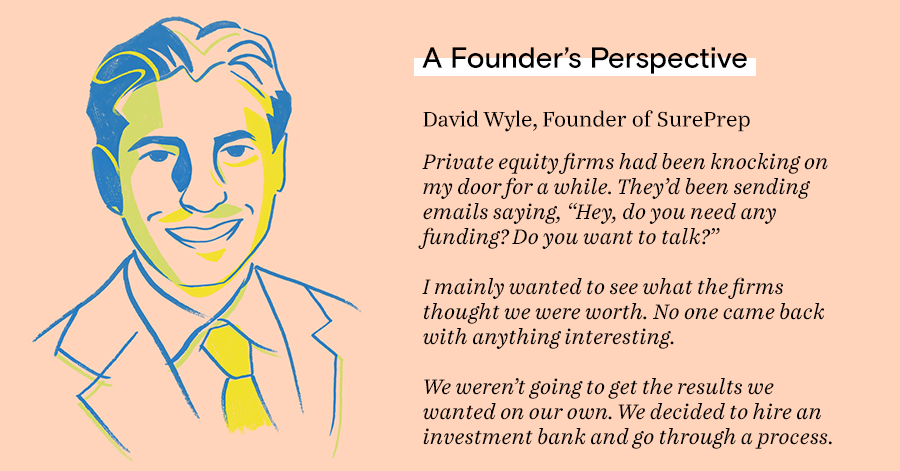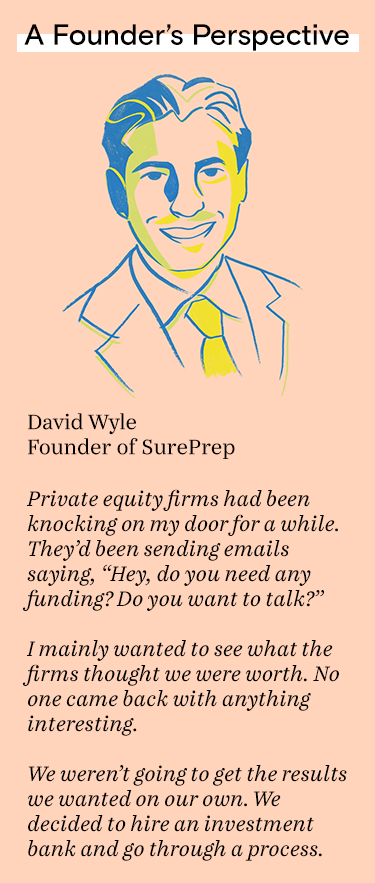The Reason So Many PE Firms Call About Your EdTech Company
- How private equity firms try to avoid competition through direct outreach
- What EdTech founders should do when a private equity firm reaches out
When private equity firms start to reach out to you about your EdTech company, you might feel like you’ve made it.
The outreach from PEs will often start around the same time your company reaches a major milestone. If you recently surpassed a certain ARR threshold, were recognized on a list like the Inc. 5000, or reached a certain employee headcount, the emails and phone calls from PEs likely started flowing in.
In EdTech specifically, milestones like integrating AI learning tools in an increasingly AI-driven space, offering demonstrable learning outcomes, or building sizable learner data sets can trigger PE outreach because acquirers prize predictable revenue and assets that can be rolled into larger education platforms or used as add-ons.
And in today’s rapidly evolving EdTech market, having PEs reach out can be flattering. When people with deep pockets suggest they want to invest in your company—a company you’ve worked hard to build up—that kind of recognition can feel special. But don’t get too excited, because this outreach might not represent the interest you were hoping for.
Your EdTech company is worth investing in, but don’t fall into the trap of thinking that’s why so many PEs reach out.
The Underlying Reasons PE Firms Come Calling
Private Equity firms reach out to a lot of EdTech companies in particular because they often have prime attributes PEs are interested in, including:
- Sticky, recurring revenue models
- Large addressable markets
- Technology-driven transformation potential (especially AI)
- Valuable learner or institutional data
- Potential to scale through roll-ups or platform strategies
The vast majority of our EdTech clients have over 30 firms emailing/calling them 2-3 times a week and sometimes have even received multiple unsolicited indications of interest (IOIs) from PEs before we ever engage to represent the company.
For them, competition drives up sellers’ prices and makes it harder to close deals. Their recourse to this challenge is to start engaging with companies earlier and earlier.
In order to reach out to so many EdTech companies, many PE firms will hire a huge team of junior-level employees with limited experience (sometimes even fresh out of undergrad) to select and cold-call companies like yours. In doing so, they’re trying to achieve the following objectives:
- Maximize their options. A large focus of private equity outreach is volume—the more companies like yours they can engage with, the greater chance they will have to invest. In EdTech, buyers cast a wide net looking for platform roll-ups, LMS/assessment tuck-ins, and data-rich learning assets that scale across channels.
- Negotiate directly with founders. When PEs reach out directly, they’re trying to circumvent the competition, negotiating directly with you so they can hopefully buy your company at a discount.
- Increase their chances of participating in your sales process. In the event that you don’t negotiate directly, PEs know you will likely take your EdTech company through a structured process with an investment bank. By reaching out early before you begin preparations for the process, they suspect you’re more likely to invite them to participate when the time comes to sell.
- Build the first relationship with founders. The first offer or first impression usually sets the tone for the rest of the conversation. If PEs can reach out early in the sales process, they are better able to set an anchor and be involved in the entire sales process. Early outreach means they’ll have more time to develop a relationship with the CEO, show they have EdTech sector expertise, suggest there is a cultural fit, or convince your team that they are the right partner to help you grow your business. In the case where the process reaches a tie, the anchored firm often has a greater chance of winning.
- Gather information. In some cases, they aren’t really interested in your EdTech company, but are simply out gathering information under the guise of due diligence. In these cases, they might be:
- Making an investment in a competitor
- Gathering information on behalf of a portfolio company
- Conducting due diligence on your market space
EdTech intel is valuable, so be cautious about sharing information, especially raw learner or PII data, without strict safeguards.
In any of these cases, freely sharing information with a PE firm may not be in your best interest.
The Pitfalls of PE Outreach
If your company has the right profile and a strong niche in the education space, you could have 30-70 private equity firms reaching out to you directly. But before you start sharing information and assembling the list of PEs you plan to include in an investment or sale process, here are a couple items to consider.
The PEs you hear from directly don’t represent the complete market
Not all PE firms will reach out to you directly through a calling approach. The majority of them actually rely on bank-run transactions for their deal-flow and will simply pay the highest price to win. If you only include in your sale process the PEs who reach out to you, you may miss out on other valuable investors.


The PEs might ask you for information that puts you at risk
As stated previously, PEs might want your information for reasons other than being interested in your business. Rather, they could be doing diligence on a market/space as they prepare to invest in another firm in the space, potentially even a close competitor. Because you can’t know which ones are sincere and which aren’t, as a general rule you’ll want to keep your cards close to the chest.
Even if the firm is sincere and interested in your EdTech business, you want to be careful about the information you share because you can and will be held accountable for it. Every PE group uses a database/CRM to log information they gather. They will use this information as a measuring stick against your business, as well as an indicator of CEO credibility (a huge valuation factor).
How to Respond When PEs Reach Out
Private equity firms will reach out, and you shouldn’t ignore them if they do. You should, however, be prepared to give the right information and talk to the right people.
What to share (or not)
Some data you can safely share without any future risk. Specifically, you can feel relatively comfortable talking about past financial performance in terms of high-level revenue and profitability. Share these metrics on your terms within context, and according to common EdTech industry benchmarks, so that PEs don’t misunderstand, because they’re paying attention and taking notes.
Never share raw data. Sometimes PEs will request raw data (often in the format of revenue by customer by month) because they can calculate many other metrics off of that data. They will calculate retention rates and create a picture of your company that may or may not be accurate. If you haven’t adequately framed or cleaned up the data, it may paint an unfavorable picture of your company that they might hold you to.
Never share forward-looking statements. Again, PEs are taking notes. They’re paying attention. If the sales process lasts an extended period of time, they are going to follow up on any projections you gave them. If you fall short of your projections, then you’ve muddied the water and may have lost credibility.
Sharing forward-looking statements also increases tension during the sales process because the projections your investment bank helps you put together probably won’t align with what you told them, taking another swing at your credibility. You have one chance to make a good first impression, so be strategic about what you share.
Build relationships with decision-makers at PE firms
When private equity firms do reach out (because they will), you should take advantage of the opportunity to get to know who you would be working with.
Your first interaction may be with a junior employee who is probably young and inexperienced. The entire job of these junior employees is to just call, call, call. If a PE is really interested in you, you should be able to pull back the curtain and talk to the partners in charge. Ultimately, the partners or other senior-level colleagues will be the ones sitting on your board and helping direct the future of your business. Get to know them so you can construct an idea of what it would be like to work with them.
Guard your time and test the waters
When 30+ PE firms are following up with you every 2-5 months, engaging with them can be a huge time suck. Make sure you’re not spending your time on activities or with firms that don’t help advance your business’ objectives.
At the same time, you want to have a lot of firms in the process as this creates a competitive environment, and competition yields better outcomes for founders.


Here are some guidelines you can follow for guarding your time and testing the waters:
If a PE firm is in town, meeting in person could be a good use of your time. Face-to-face interaction will help you get to know the person you could be doing business with. Especially if a decision-maker at a firm that’s known for paying high valuations is in town, you should find time to meet with them.
If they suggest they are value additive, put them to the test. PE firms will often (more like always) pitch that they are value additive because of their experience in the EdTech space or because they have certain companies in their portfolio. Put them to the test by asking them to introduce you to some of their portfolio companies in your same space.
If they suggest they can help you engage with the right EdTech network, put them to the test. When a PE tells you that they can help you scale your management team, ask for an introduction to some of the people in their network and see for yourself.
Seek Out Guides Who Know the Terrain
The EdTech landscape is shifting fast, and that creates attractive, targeted funding opportunities for founders. But not all investors are alike. Prioritize partners who deliver more than capital: those who pay premium valuations, command higher multiples, and bring sector-specific value.
If you’re an EdTech founder, consider working with advisors who have specific experience executing transactions in your space. At Vista Point Advisors, we’ve completed over 125 software and internet transactions, with over 20 percent of those in the EdTech sector alone.
As a sell-side-only investment bank, we help EdTech founders:
- Qualify PE firms before you even start discussions
- Determine what information to share (or not), and when
- Understand all of your transaction options
- Navigate sector-specific challenges and opportunities
- Set up a competitive process to engage the full buyer universe (not just the PEs who cold-call you)
- Avoid the pitfalls of engaging directly with buyers
Ultimately, running a more structured process with an investment bank can help you increase the chances for a better outcome, whether it’s with one of the PE firms that approached you or another from the bank’s tried-and-true network.